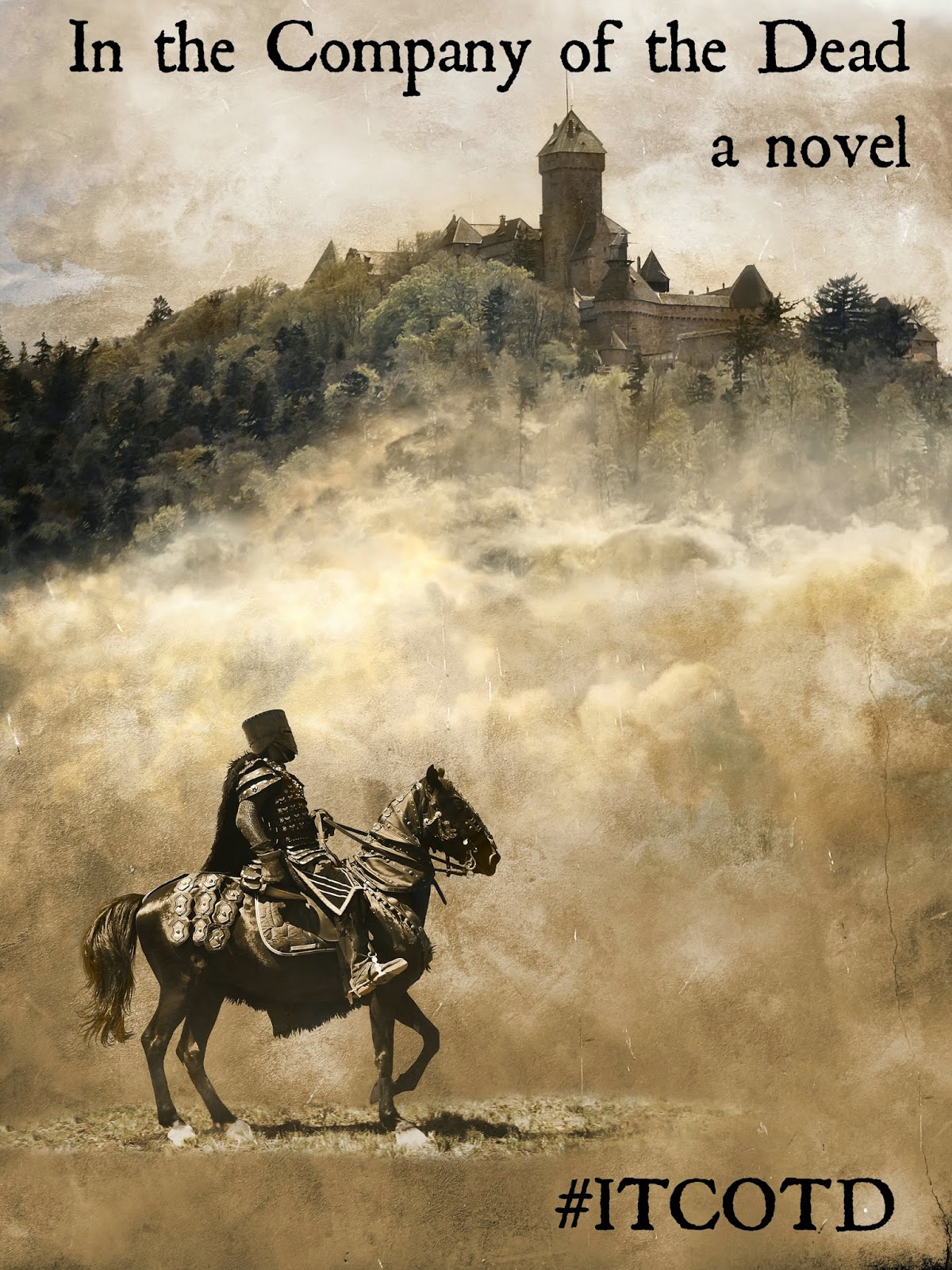Welcome to the Monday Morsel feature, where I share short excerpts from the first draft of my adult epic fantasy/fantasy romance, In the Company of the Dead.
* * *
Lyram dropped lightly to the ground. Turning, he reached up to help Ellaeva down, but she dropped to the grass beside him with a slight thump.
‘This way.’ He dashed the short distance from the wall to the cover of the trees. On the other side of the wall they'd just climbed, thirty men in dark clothes still waited, crouched against the grassy hillside for the signal.
Ellaeva dropped into a crouch next to Lyram, her eyes scanning the darkness. ‘There.’
She pointed into the darkness, and Lyram forced his gaze from her. For this venture, she’d divested herself of the bulky robes in favour of a man’s shirt and pants, revealing a surprisingly lithe form.
It’s a sin to think such things of the Death Priestess, I’m sure. At the very least, she’d kill him for it.
 In the direction she pointed, a sentry crouched against a tree in the darkness. Lyram scoured the night, searching for the next man along. He knew he was there, had scouted their positions earlier while she spoke to the men, but the moon had set, and it was hard to distinguish the shadows in the deep blackness of the night. He frowned at one shadowed shape and nudged Ellaeva, nodding his head. She turned to follow his gaze, lips pursing the nodded.
‘And here,’ she whispered, pointing further along again.
He squinted, and couldn’t see what she indicated. How could she see so far in the night? Another gift of her goddess, probably.
‘You take that one,’ he said. ‘And the middle one.’
She nodded, and stood, gliding away into the shadows on noiseless feet. He watched her go, his eyes following the curve of her legs and buttocks in the breeches.
In the direction she pointed, a sentry crouched against a tree in the darkness. Lyram scoured the night, searching for the next man along. He knew he was there, had scouted their positions earlier while she spoke to the men, but the moon had set, and it was hard to distinguish the shadows in the deep blackness of the night. He frowned at one shadowed shape and nudged Ellaeva, nodding his head. She turned to follow his gaze, lips pursing the nodded.
‘And here,’ she whispered, pointing further along again.
He squinted, and couldn’t see what she indicated. How could she see so far in the night? Another gift of her goddess, probably.
‘You take that one,’ he said. ‘And the middle one.’
She nodded, and stood, gliding away into the shadows on noiseless feet. He watched her go, his eyes following the curve of her legs and buttocks in the breeches.
He wrenched his eyes away, his cheeks burning.
* * *
Thanks for dropping by! Don't forget, this is a first draft, and as such won't be perfect. If you like what you read, and are so inclined, show your support by leaving a comment, and In the Company of the Dead will be available in the future. I've temporarily had to shelve it while I work on Stalking the Demon, the sequel to Confronting the Demon. If you'd like to sample more of my writing, check out the free short stories available on this site.
If this is your first visit to Monday Morsels, find others in the series by clicking on the ‘Monday morsel’ tag, or go to the first installment.
More about In the Company of the Dead:
Lyram already crossed a prince, and now he finds himself on the brink of crossing a god.
Son of a duke and second in line for the throne, Lyram is exiled to a lonely castle after assaulting the crown prince. When a hostile army arrives to besiege the castle, he believes the prince wants him removed – permanently.
As though answering their prayers, Ellaeva, the Battle Priestess of the death goddess, arrives unexpectedly. But she has not come to break the siege. Instead, she is in pursuit of a necromancer of the evil god of decay. When misfortune after misfortune befalls the beleaguered defenders, Lyram realises the necromancer is hidden within the walls, sabotaging the very defence.
Against the backdrop of clashing gods, Lyram must fight to save himself from the political machinations of his prince, and the dread plans of a necromancer. But as the siege lengthens, he realises the greatest threat may come from another quarter — a woman sworn body and soul to a god tempts him to pay a terrible price.
If you enjoyed this post, please feel free to check out my previous posts if you haven't already. If you're finding yourself here often, you might like to join as a member, sign up to the blog through RSS or email, or sign-up to my newsletter. Check out my May Newsletter if you missed it.
Don't forget to share the love and spread the word on Twitter, Facebook or StumbleUpon (or other social networking site of your choice) if you know other people who might also enjoy this.
Thanks for stopping by and visiting!
.jpg)






